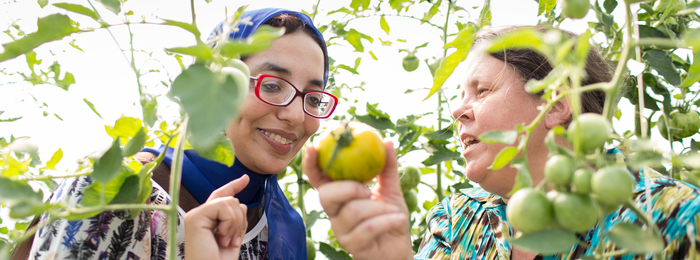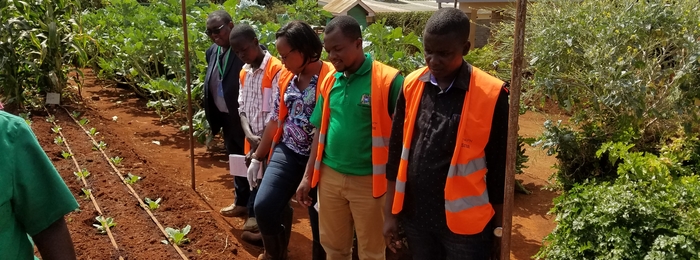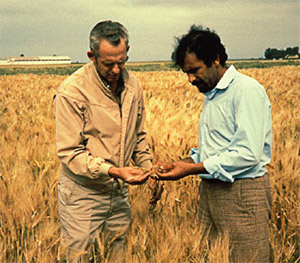Global initiatives
Minnesota is part of an increasingly connected global network, which benefits from exchanges in education, research and development.
Extension engages with scientists, teachers and learners around the world, and with diverse communities at home. Efforts build capacity locally and internationally to enhance livelihoods, while building a national network of professionals with expertise in similar initiatives.
Current efforts are funded through partnership with the U.S. Department of Agriculture, grants from other partners and donor gifts.
Extension Global Initiatives programs meet at least one of three criteria:
- A Minnesota-based organization is a partner or collaborator
- The program supports a wider University of Minnesota initiative
- Unique Extension expertise meets a critical need
History
Extension's global work began with supporting agricultural exports during and after World War I. In the 1960s and 1970s, a relationship started with Morocco.
The "Minnesota Project" educated nearly 250 Moroccans, who then returned to Morocco to create a world-class research and teaching institute. Many maintain relationships with Minnesota researchers and businesses today. This 1970s photo shows doctoral student Ahmed Zahour (right) and Zahour's adviser, Donald Rasmussen, a U of M world expert in barley.
Extension is frequently invited by other countries to share the model of connecting communities to University research. The model appeals to people because it engages people in their own learning with each other.
Connecting with learners across the globe
Extension Global Initiatives connects University research, education and training to learners in:
In partnership with the USDA Cochran Fellowship Program, the Agricultural Extension training program included training on agricultural extension, program design, monitoring and evaluation, and public-private partnerships.
Cultural, scientific and academic collaboration
The Extension Department of Agricultural and Natural Resource Systems partners with the Federal University of Mato Grosso (UFMT) to support the development of education programs at UFMT-Sinop. The goal is to build the capacity for faculty from UFMT-Sinop to create an education system that addresses the needs of local producers using an approach based on adult, non-formal learning. This collaboration is funded by the Federation of Agriculture and Livestock of the State of Mato Grosso’s financial support to the UFMT Foundation.
Climate smart agriculture
The USDA Foreign Agriculture Service requested this training program. It focused on potential impacts of climate change on agriculture, forestry and natural resources. The University of Minnesota’s Institute on the Environment partnered with Extension to develop training for 10 Cochran Fellows. The program included visits to two USDA Regional Climate Hubs. It enhanced Brazil’s capacity to support the global agreement on climate change signed in 2016 in Paris.
Meat processing
Extension developed a 10-day program highlighting key associations in the meat industry. The training distinguished roles and functions of government agencies and the private sector. It included quality principles and standards, new research, safety regulation and risk analysis. It was funded by the USDA’s U.S. – China Scientific Cooperation and Research Program.
U.S. grain management for feed and milling
Four Cochran Fellows traveled to Minnesota to learn about wheat production from farm to export. The fellows learned about crop improvement, grain processing, risk management, pest and disease control, grain inspection and quality control, and export regulations. The program aimed to strengthen the presence of U.S. grains in Ethiopian markets. It was funded by the USDA Foreign Agricultural Service.
Agricultural cooperatives development
Three Assistant Agricultural Officers from Farm Institutes in Ghana were selected as Cochran Fellows to learn how to successfully organize agricultural cooperatives. The participants learned about the structure of U.S. farming cooperatives and about effective financial management. The cohort developed a curriculum about cooperatives to be implemented by the Farm Institutes when participants returned to Ghana. The training reflected the value of strong cooperatives in improving farmers’ livelihoods.
Building rural youth and family education programs
The Extension departments of Family, Health and Wellbeing and Youth Development work with colleagues at the University of San Carlos (USAC) to train facilitators in community development and social outreach programming. The goal is to build the capacity of university leaders to enhance the value of student internships in local communities. Extension works with the USAC’s Extension office and its School of Social Work.
School meals
The Cochran Fellowship Program’s Latin American Region supported a two-week professional training in school meals. It educated seven fellows on administrative and nutritional aspects of school feeding programs. Fellows from the Ministry of Agriculture, Ministry of Education and Ministry of Finances learned about U.S. efforts under the National School Lunch Program and the U.S. agriculture sector. The goal of the training was to build food and market systems that expand trade and economic growth between the U.S. and Guatemala through food assistance programs.
Extension regional staff hosted 17 farmers from Hokkaido, Japan. The participants were from the Tokachi Federation of Agricultural Cooperatives who came to learn about agricultural systems in southeastern Minnesota.
Rural leadership development
The Leadership and Civic Engagement team is developing a program with Kisii University to create a rural leadership training program for southwestern Kenya. The program includes selecting training facilitators and collaborating with them to adapt leadership training curriculum for the local context. Afterwards, the Extension team will mentor these facilitators as they implement a four-session training program with two cohorts of Kenyans. The goal is train future leaders across southwest Kenya to thrive in a decentralized decision-making environment.
Postharvest technologies and Extension
In partnership with Kisii University, Extension received funding from the USDA Scientific Cooperation and Research Program to work with 200 female farmers growing leafy vegetables. The goal of the program was to improve the quality of the vegetables in the field and to develop best practices in reducing losses during post-harvest handling and while transporting vegetables to market. The women participated in a series of four workshops and observed improved management practices in ten demonstration plots established in Kisii and Nyamira counties.
Transformational leadership in higher education
Through the World Learning Program and in partnership with the University of Minnesota College of Veterinary Medicine, Extension supported the agricultural faculty at the University of Pristina. The team from Minnesota worked with colleagues to develop a modern academic and research program for agriculture, food systems and animal care. The programs prepare Kosovan graduates to confront the challenges of a growing economy and developing state. The U.S. Agency for International Development (USAID) funded this program.
The University of Minnesota has conducted exchange programs with the Kingdom of Morocco for over 40 years. Efforts began in 1962 with the first Fulbright Scholar and continued with support through USAID. The University of Minnesota views Morocco as a key international partner. These programs have strengthened the relationship.
Doctoral training
University of Mohammed VI Polytechnic partners with Extension to have two doctoral students from the School of Agriculture, Fertilizer and Environmental Sciences pursuing degrees in the College of Food, Agricultural and Natural Resource Sciences. The current pair of students are completing studies in water resources and precision agriculture while conducting their research on current Moroccan environmental issues.
Agricultural Extension and rural advisory services
Through the Cochran Fellowship Program, twelve Ministry of Agriculture and Maritime Fisheries officials were trained on agricultural extension, program design, monitoring and evaluation, and public-private partnerships.
Rural leadership training
The Department of Community Development adapted leadership curriculum for executive members of rural farmers associations in Morocco. The training program consisted of a series of three workshops in collaboration with professors from the National School of Agriculture in Meknès. The rural training strengthened the leadership and strategic planning capabilities of rural farmer associations over a 12-month period. It was funded through the USAID-funded Farmer-to-Farmer program awarded to the Volunteers for Economic Growth Alliance.
At your service
The Tourism Center adapted At Your Service customer service training for use in Morocco. Extension trained Moroccan facilitators from the Rural Tourism Development Network and the University of Ibn Zohr, who were mentored while conducting the first workshop in Morocco.
Grain marketing
Extension educators and researchers facilitated this educational program for Cochran Fellows about marketing, production strategies and risk management in the U.S. grain and animal feed sector. Initially, the Fellows met in Washington, D.C. to learn about federal oversight and industry guidelines. In Minnesota, the participants engaged with local educators and industry professionals while witnessing grain production processes. The goal was to strengthen the presence of U.S. grains in the Moroccan and Tunisian markets.
One Village Partners (OVP), a Minnesota-based non-governmental organization, collaborates with rural communities to help them achieve their vision of a better life. The organization works with community volunteer leaders to design, implement and evaluate projects. For example, OVP has conducted financial literacy training for women and has built public handwashing stations using local resources. Extension has assisted the program committee with strategic thinking, guidance and feedback.
Cooperative management
A team of government representatives was selected for this training program funded by the USDA’s Cochran Fellowship. The goal was to build capacity in agricultural cooperative management. The Fellows learned about the principles and governance of independent cooperatives, examining U.S. systems as a model. During the program, the Tunisian Fellows devised training and mentoring programs to build and support successful cooperatives that enhance farmers’ quality of life.
Grain marketing
Extension educators and researchers facilitated this program for Cochran Fellows about marketing, production strategies and risk management in the U.S. grain and animal feed sector. Initially, the Fellows met in Washington, D.C. to learn about federal oversight and industry guidelines. In Minnesota, the participants engaged with local educators and industry professionals while witnessing grain production processes. The goal was to strengthen the presence of U.S. grains and cereals in the Moroccan and Tunisian markets.
Swine production and Extension
Ministry of Agriculture officials selected as USDA Cochran Fellows learned about swine production and extension education programming. The focus of the training was biosecurity systems and improved genetics breeding programs implemented by local producers.
Don’t Pack a Pest for Academic Travelers is a national program to educate academic travelers about the risks of introducing pests and diseases when carrying agricultural products across international borders. This program is funded by USDA Animal and Plant Health Inspection Service in partnership with the U. S. Customs and Border Patrol. University of Minnesota has joined the effort to research academic travelers’ knowledge about this risk and will be developing targeted educational materials about the program specific to the Minnesota experience.
Two young leaders initiatives sponsored by the U. S. Department of State, Bureau of Educational and Cultural Affairs and coordinated by IREX provide opportunities to connect with the next generation of leaders. The programs support leaders in their career development. Young leaders share cultural and practical knowledge with Extension educators during a 4- to 6-week professional development experience. During these mentorships, educators guide one fellow to achieve their career goals. U of M Extension participates in Young African Leaders Initiative and Young Leaders of the Americas Initiative.




